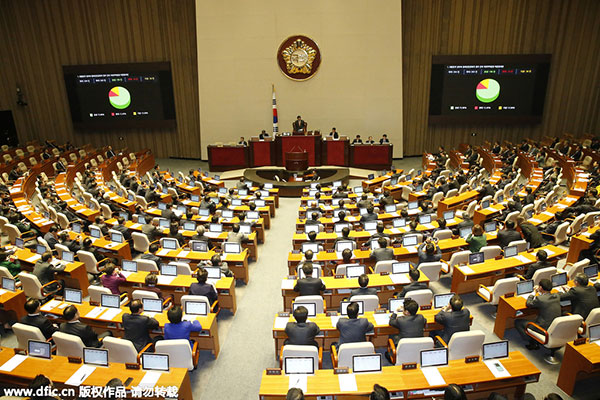 |
|
South Korea's parliament ratifies its free trade agreement (FTA) with China during the plenary session, Nov 30, 2015.[Photo/IC] |
Goods and services trade between China and South Korea is set for a quantum leap after the much-anticipated free trade agreement between the two countries crossed a crucial legislative hurdle on Monday.
The National Assembly of South Korea gave the green light to the bilateral trade treaty with Beijing after South Korea's ruling Saenuri Party and the main opposition party New Politics Alliance for Democracy, agreed that it was necessary to take effective measures to support industries.
The green light from Seoul comes close on the heels of reports that the China-Australia FTA may be ratified by the Parliament of Australia before the end of the year, after Australian government and opposition Labor Party reached a compromise over the deal last month.
Both the deals were signed in June this year.
"Since both FTAs focus on goods and the removal of import and export tariffs, both sides are keen on concluding the deals as early as possible so that they can export more products to China, as well as gain access to its huge markets and consumers," said Lin Guijun, vice-president of the University of International Business and Economics in Beijing.
Lin said unlike the China-Singapore or China-New Zealand FTAs signed in 2008, the China-South Korea and China-Australia FTAs have advanced articles on services trade. Investment is also important as both countries are major overseas investment destinations for Chinese companies.
South Korea's exports declined the most in more than six years in October, with steep falls in shipments to China, the United States and Europe, indicating weak global demand.
Eager to enhance the country's earning ability, South Korean President Park Geun-hye has repeatedly pressed lawmakers to approve a number of free trade agreements-inked with China, New Zealand and Vietnam-to ensure that they become effective by the end of this year.
South Korea's Ministry of Strategy and Finance had warned that delays in the FTA approval process could lead to daily losses of more than 22 million yuan ($3.44 million) for its export-oriented firms.
China is South Korea's biggest trading partner as well as its biggest export market, with trade between the two sides at $235.4 billion in 2014, according to customs data. South Korea is also one of China's major foreign investors with investment of $2.25 billion made from January to September this year.
Zhang Jianping, director of the International Economic Cooperation Institute at the National Development and Reform Commission, said since South Korea is proficient in operating services trade and related sectors like logistics, tourism, shipping, healthcare, finance and smart-city development, its businesses believe the China-South Korea FTA can be enriched and diversified through services and investment-fueled economic development models.
The Australian government and companies there are also increasingly concerned about what they see as weak global market demand, in particular, for its energy and commodity products and more difficult operating conditions as the economy posts slower growth.
"Therefore, no side would want to miss such a great opportunity and would be keen to finish the legislative review as early as possible. After all, early birds can gain more export and investment opportunities from China," said Zhang.
China is already Australia's largest market, with commodities, natural resources and agricultural products at the top of its export list. Trade volumes between China and Australia jumped from $88.1 billion in 2010 to $136.9 billion in 2014. Australia had $9.4 billion trade surplus with China last year.
